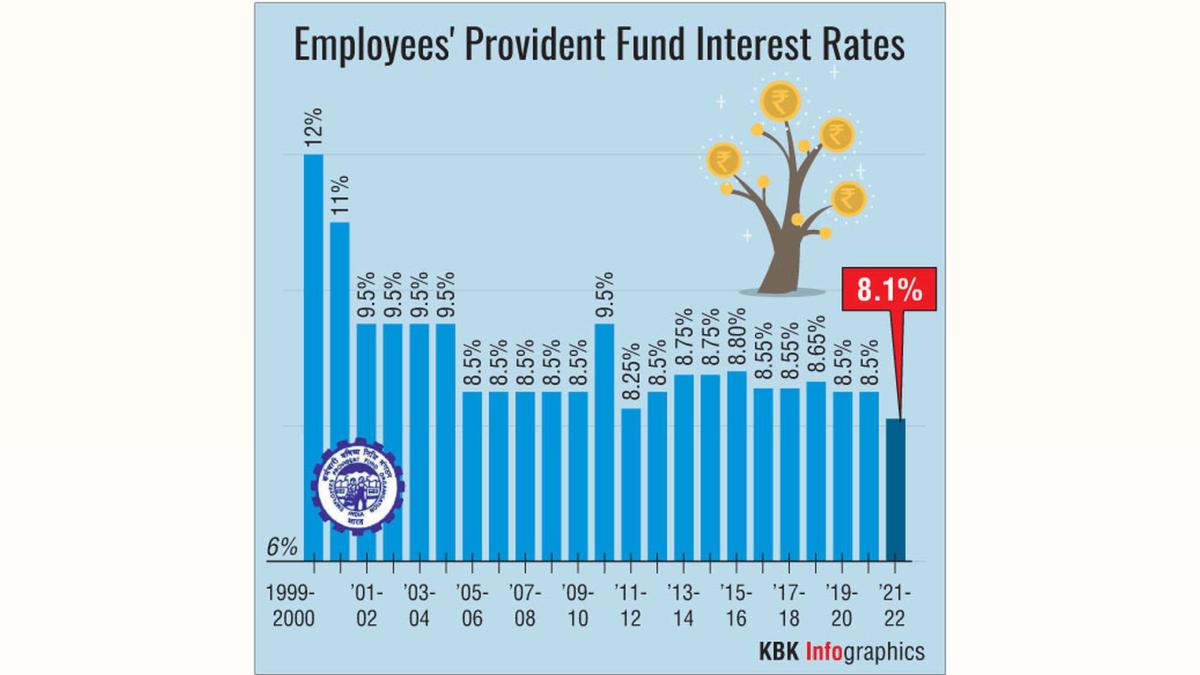EPFO to Evaluate Karnataka HC Judgement on Foreign Workers
The EPFO is evaluating the Karnataka High Court's judgement that deemed the inclusion of foreign workers in the provident fund unconstitutional. The court's decision impacts India's social security agreements with 21 countries.

Illustration: Uttam Ghosh/Rediff.com
New Delhi, May 7 (PTI) Retirement fund body EPFO on Tuesday said that it is evaluating the course of action with regard to the judgement of Karnataka High Court holding the inclusion of foreign workers in the provident fund as 'unconstitutional'.
The Karnataka High Court has struck down the provisions of inclusion of international workers within the ambit of employees' provident fund and pension scheme saying that it is "unconstitutional and arbitrary".
"While holding the highest regard for the Court's decision, the EPFO (Employees' Provident Fund Organisation) is actively evaluating the course of action in response to this judgement," the EPFO said in response to the queries pertaining to the judgement.
The judgement pertains to the specific provisions for International Workers outlined in Paragraph 83 of the Employees' Provident Fund Scheme, 1952 and Paragraph 43A of the Employees' Pension Scheme, 1995, which were deemed to be inconsistent with Article 14 of the Constitution, the EPFO noted.
Paragraph 83 of the Employees' Provident Fund Scheme, 1952 relates to Special provisions in respect of international workers.
This clause provides that with effect from October 1, 2008, every international worker whose basic wages (basic pay and dearness allowance) is up to Rs 15,000 per month, shall be mandatorily covered under the scheme.
Article 14 of the Constitution of India provides that the state shall not deny to any person equality before the law or the equal protection of the laws within the territory of India, on grounds of religion, race, caste, sex or place of birth.
India presently has social security agreements with 21 countries. These agreements ensure continued social security coverage for employees from these nations on a mutually reciprocal basis.
The EPFO explained that when citizens from these countries take up employment in each other's territories, their social security coverage remains uninterrupted.
Social security agreements between countries are sovereign agreements established by the Government of India with its counterparts.
These agreements aim to guarantee the uninterrupted social security coverage of employees during international employment.
The agreements must essentially adhere to internationally recognized principles and are not necessarily restricted by wage ceilings applicable to domestic EPF members, it stated.
These agreements are very important for India for promoting International mobility and leveraging the demographic dividend, it noted.
The EPFO serves as the operational agency in India for such social security agreements, it stated.
The EPF Act empowers the Central Government to formulate separate schemes for different employee categories, it stated adding that the EPF Scheme acknowledges this by including special provisions for specific groups, such as newspaper employees, cine workers, and international workers.
These groups have distinct enrolment and contribution regulations.
The EPFO further stated that the Supreme Court of India in its judgement on November 4th November 2022 in Sunil Kumar B & Other case, had opined that the classification of the employees based on the salary drawn meets the test of reasonable classification contemplated in Article 14 of the Constitution of India.
The Karnataka High Court has struck down the provisions of inclusion of international workers within the ambit of employees' provident fund and pension scheme saying that it is "unconstitutional and arbitrary".
"While holding the highest regard for the Court's decision, the EPFO (Employees' Provident Fund Organisation) is actively evaluating the course of action in response to this judgement," the EPFO said in response to the queries pertaining to the judgement.
The judgement pertains to the specific provisions for International Workers outlined in Paragraph 83 of the Employees' Provident Fund Scheme, 1952 and Paragraph 43A of the Employees' Pension Scheme, 1995, which were deemed to be inconsistent with Article 14 of the Constitution, the EPFO noted.
Paragraph 83 of the Employees' Provident Fund Scheme, 1952 relates to Special provisions in respect of international workers.
This clause provides that with effect from October 1, 2008, every international worker whose basic wages (basic pay and dearness allowance) is up to Rs 15,000 per month, shall be mandatorily covered under the scheme.
Article 14 of the Constitution of India provides that the state shall not deny to any person equality before the law or the equal protection of the laws within the territory of India, on grounds of religion, race, caste, sex or place of birth.
India presently has social security agreements with 21 countries. These agreements ensure continued social security coverage for employees from these nations on a mutually reciprocal basis.
The EPFO explained that when citizens from these countries take up employment in each other's territories, their social security coverage remains uninterrupted.
Social security agreements between countries are sovereign agreements established by the Government of India with its counterparts.
These agreements aim to guarantee the uninterrupted social security coverage of employees during international employment.
The agreements must essentially adhere to internationally recognized principles and are not necessarily restricted by wage ceilings applicable to domestic EPF members, it stated.
These agreements are very important for India for promoting International mobility and leveraging the demographic dividend, it noted.
The EPFO serves as the operational agency in India for such social security agreements, it stated.
The EPF Act empowers the Central Government to formulate separate schemes for different employee categories, it stated adding that the EPF Scheme acknowledges this by including special provisions for specific groups, such as newspaper employees, cine workers, and international workers.
These groups have distinct enrolment and contribution regulations.
The EPFO further stated that the Supreme Court of India in its judgement on November 4th November 2022 in Sunil Kumar B & Other case, had opined that the classification of the employees based on the salary drawn meets the test of reasonable classification contemplated in Article 14 of the Constitution of India.
You May Like To Read
TODAY'S MOST TRADED COMPANIES
- Company Name
- Price
- Volume
- Vodafone-Idea-L
- 10.80 (+ 1.12)
- 64479733
- Pradhin
- 0.27 (+ 17.39)
- 41923542
- Sattva-Sukun-Lifecar
- 0.56 (+ 5.66)
- 34488002
- Alstone-Textiles
- 0.30 ( 0.00)
- 34091490
- Sunshine-Capital
- 0.25 ( -3.85)
- 30901660





